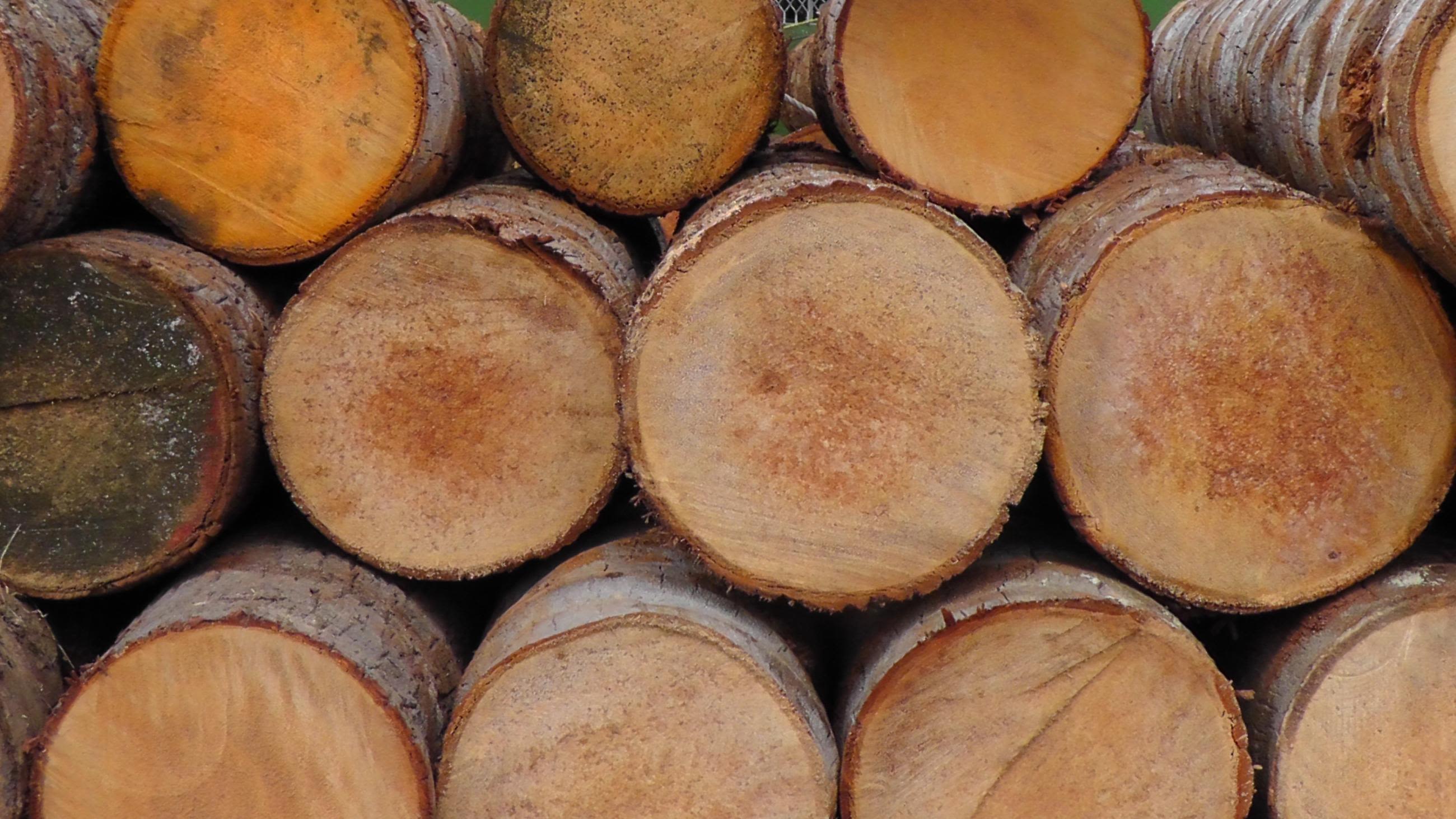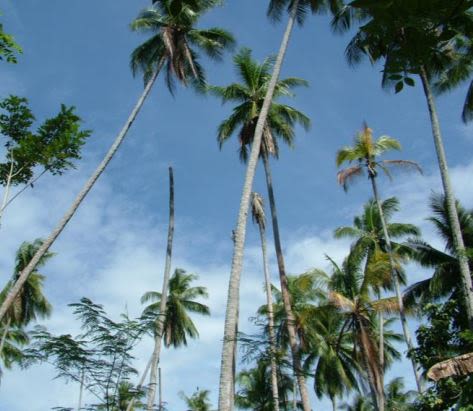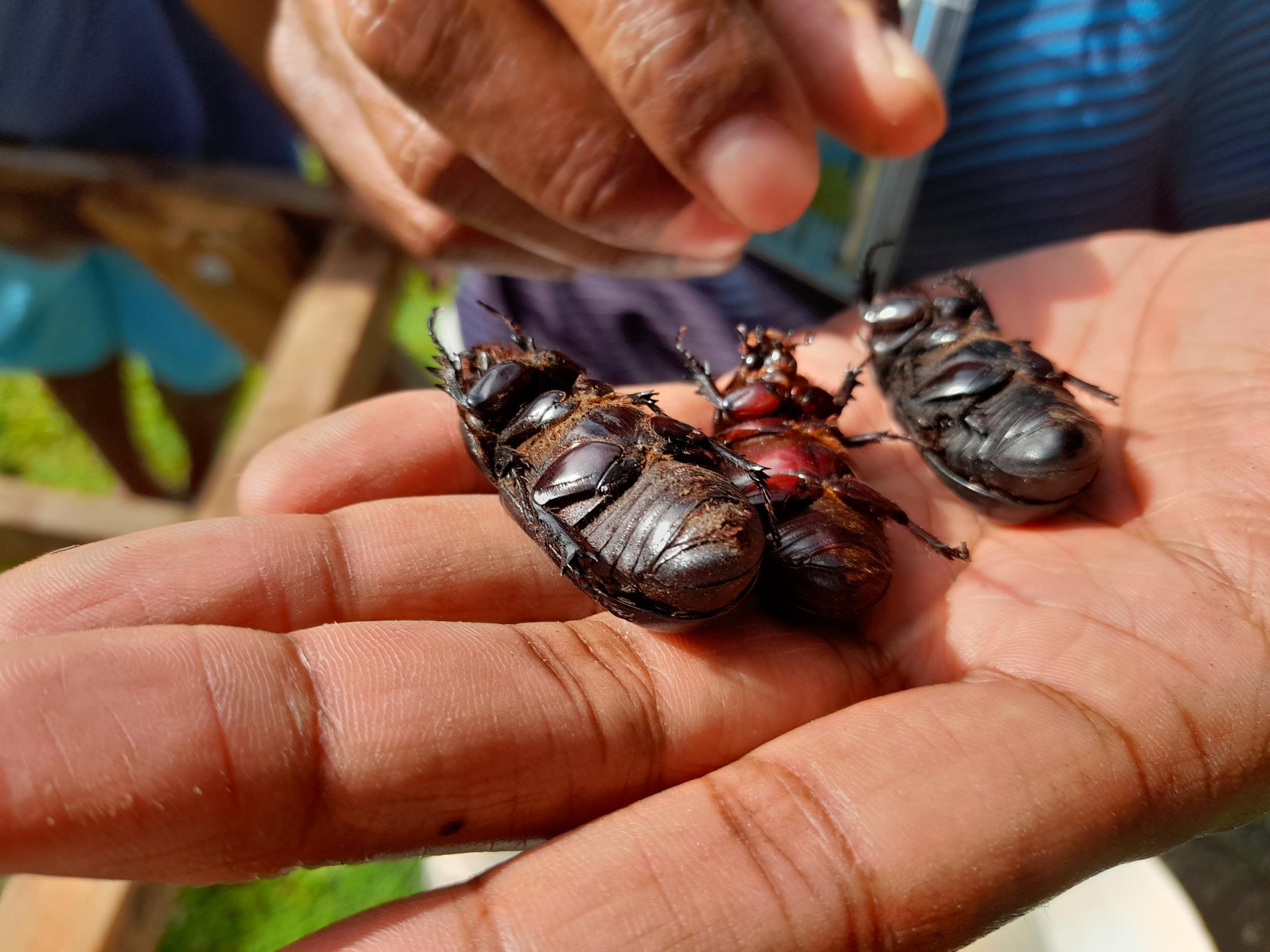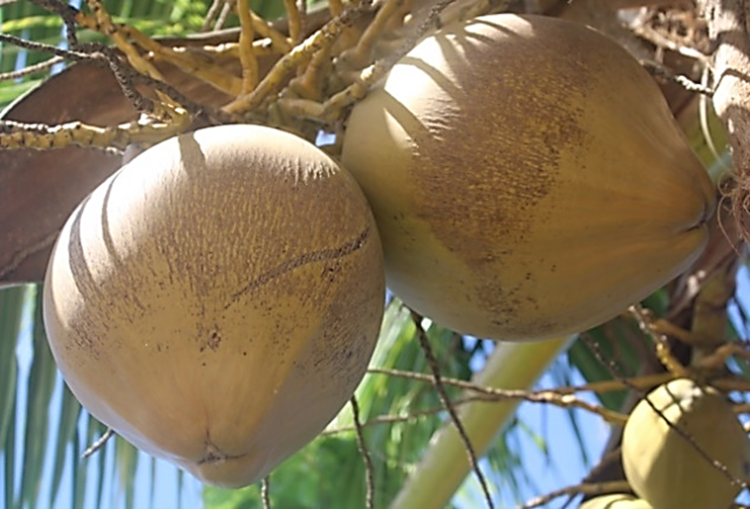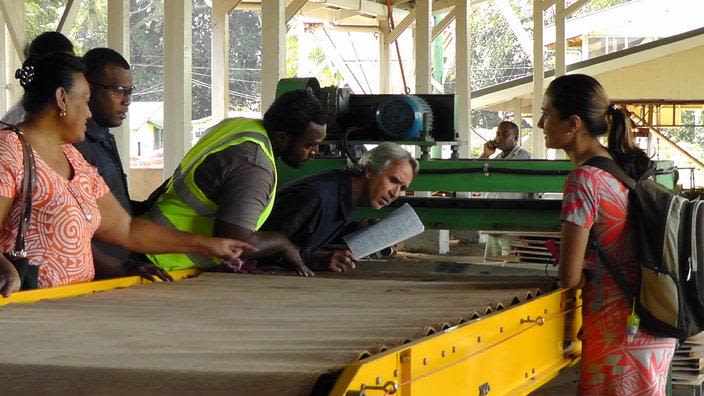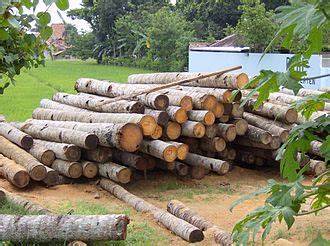COCONUT "TREE OF LIFE"
The Pacific knowledge bank for coconut research and development
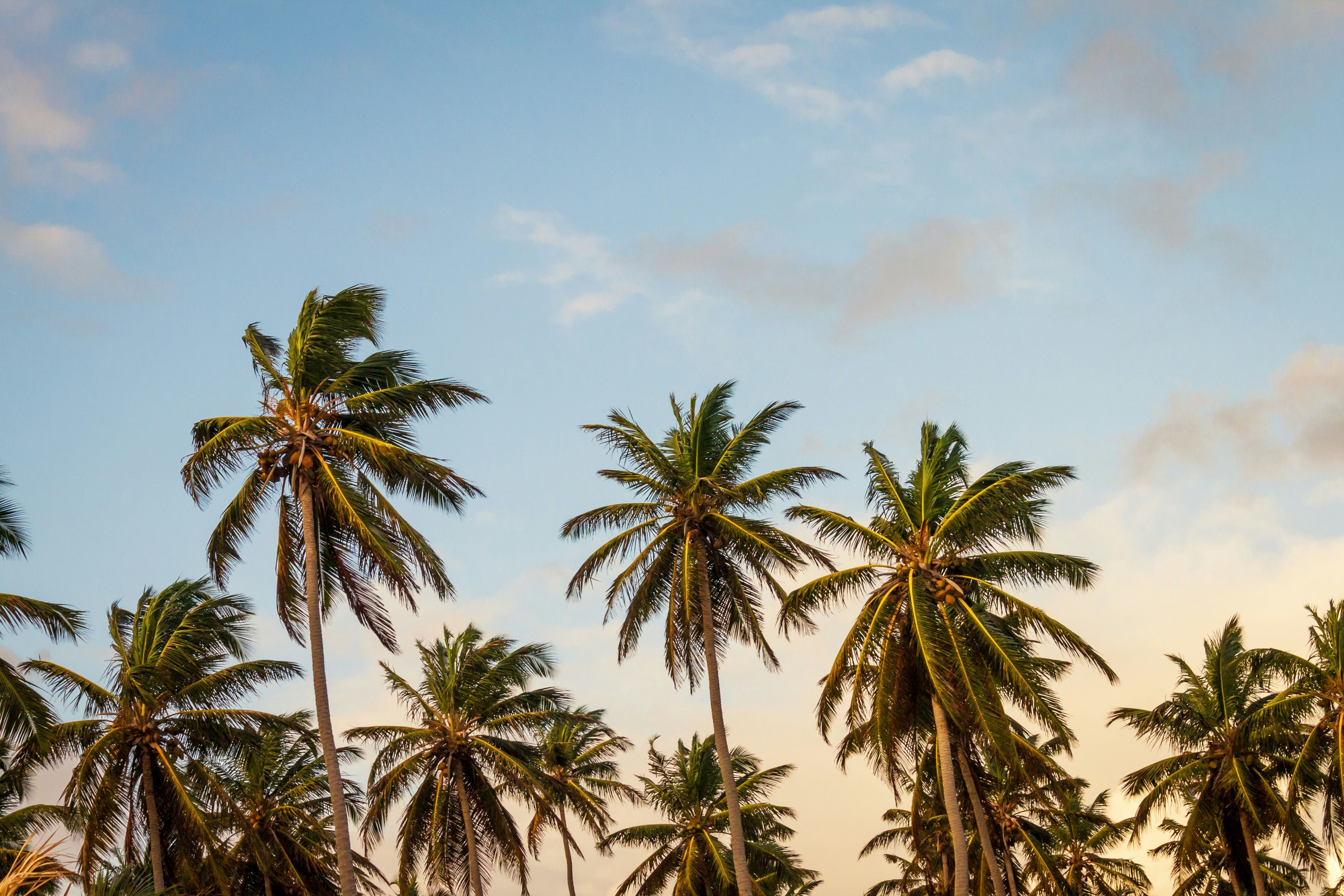
Integrated programmes under the Pacific Community's (SPC) Land Resources Division (LRD) address interdisciplinary challenges by drawing on capacities and technical expertise from across the LRD thematic pillars: genetic resources, sustainable forests and landscapes, sustainable agriculture, and market for livelihoods.
These integrated programmes foster scientific capacity and expertise from these four key work areas, to strengthen Pacific scientific research.
The web page 'Coconut Tree of Life' acts as a Coconut Knowledge bank, allowing you to discover and browse in one place all the coconut projects and other coconut programmes at LRD, as well as relevant resources.
Coconut research projects
Future Engineered
Wood Product (EWP)
Current 2021 - 2026
EWP aims to address not only the technical, scientific and operational side of peeling senile coconut stems to create Engineered Wood Products (EWPs) but also the economic and social development facets of the coconut value chain from tree log to market.
Pacific Awareness and Response to Coconut Rhinoceros Beetle (PARC)
Current 2019 - 2024
The PARC project works to address the regional spread of the invasive Coconut Rhinoceros Beetle (CRB), as the pest has greatly impacted the livelihood of over 60 percent of Pacific Islanders who depend on coconut and other palms for food, water, and economic security.
Safeguarding threatened coconut diversity within the upgraded ICG for the South Pacific (PR-363)
Current (2020 - 2024)
This project is building on the previous DARWIN project. Coconut and its genetic diversity provide significant nutrition and multi-million dollars income for more than 8 million Asia-Pacific households. Broader coconut diversity is needed to supply ambitious replanting programmes aiming to replenish coconut palm populations seriously depleted.
Cocoveneer project
Past (2012 - 2016)
The Cocoveneer project aimed to develop the technologies, processes, and expertise to produce veneer and veneer-based products of various grades from senile coconut stems. It enhanced livelihoods in South Pacific communities through development of a valuable product from the senile stems, and supported economic development in Fiji, Samoa and the Solomon Islands.
Cocowood Improvement Project
Past (2007 - 2010)
The project's goal was to provide the science to underpin coconut wood production, engineering and marketing initiatives and address gaps in common understanding of cocowood properties and suitable processing technologies. Project outcomes provided long term benefits by improving the manufacture and acceptance of coconut wood in flooring market. Local business and communities also benefited from the development of appropriate technologies.

Coconut integrated programmes
Supporting an international initiative to maintain the Coconut Genetic Resources Network (COGENT)
Past (2019 - 2022)
The International Coconut Genetic Resources Network (COGENT) aims to promote collaboration for the conservation and use of coconut genetic resources. COGENT currently is made up of 39 country members. The network aims to develop and implement an international mechanism to coordinate research activities of national, regional and global significance, particularly in germplasm exploration, collecting, conservation and enhancement. It also aims to establish a basis for collaboration on the broader aspects of coconut research and development.
Coconut Strategic Framework and Regional Network for the Pacific
Current (2022 - 2024)
To retain the cultural significance and benefit from the global demand for coconut products, Pacific island countries and territories require improved, effective, and efficient resource management to overcome constraints such as variety limitations, impacts of climate change, low production of senile palms, and effects of pests and diseases. This project aims to develop the first inclusive regional platform for coconut research and development, owned and managed by the Pacific, for the Pacific.

Publications
Reports
- Coconut and other non-traditional forest resources for the manufacture of Engineered Wood Products (EWP) - Review of Fiji's existing coconut resource information, SPC, 2024.
- Coconut and other non-traditional forest resources for the manufacture of Engineered Wood Products (EWP) - Determining wood quality of ‘other’ Fijian forest resources with potential suitability for EWPs, Fiji Ministry of Forestry, xxxx.
- Coconut and other non-traditional forest resources for the manufacture of Engineered Wood Products (EWP) - Suitability and Market Potential of Coconut Wood EWP, ACIAR, 2023.
- Status report of coconut sectors in Pacific Island Countries and Territories, SPC, 2023.
- Coconut and other non-traditional forest resources for the manufacture of Engineered Wood Products (EWP) - Practical considerations for heating logs prior to peeling, Rhianna Robinson, 2023.
- Log Heating for Veneer Production: A Review of Techniques and Factors, Queensland Department of Agriculture and Fisheries, 2023.
- Coconut and other non-traditional forest resources for the manufacture of Engineered Wood Products (EWP) - Enabling environment and supporting functions required for efficient operation of the EWP value chain, PHAMA Plus/SPC/FNU, 2023.
- Coconut and other non-traditional forest resources for the manufacture of Engineered Wood Products (EWP) - Potential market access or marketing constraints (including legal and regulatory requirements, quality assurance protocols, certification requirements) for Engineered Wood Products, PHAMA Plus, 2023.
- Coconut and other non-traditional forest resources for the manufacture of Engineered Wood Products (EWP) - Financial and Economic Modelling Report 2: Utilising senile coconut palms for the manufacture of veneer and engineered wood product manufacture in Fiji: A comprehensive review of published literature, UQ, 2023.
- Coconut and other non-traditional forest resources for the manufacture of Engineered Wood Products (EWP) - Financial and Economic Modelling Report 5: Final ‘Forest to Mill’ Module for the Mathematical Programming Model to Support Engineered Wood Product Manufacturing Decisions, UQ/Queensland Department of Agriculture and Fisheries, 2023.
- Coconut and other non-traditional forest resources for the manufacture of Engineered Wood Products (EWP) - Financial and Economic Modelling Report 6: Fijian Application of the ‘Forest to Mill’ Module for the Mathematical Programming Model to Support Engineered Wood Product Manufacturing Decisions, UQ/Queensland Department of Agriculture and Fisheries, 2023.
- Coconut and other non-traditional forest resources for the manufacture of Engineered Wood Products (EWP) - Financial and Economic Modelling Report 7: Queensland Application of the Mill-Gate to Manufactured EWP Module of the Mathematical Programming Model to Support Engineered Wood Product Manufacturing Decisions, UQ/Queensland Department of Agriculture and Fisheries, 2023.
- Coconut and other non-traditional forest resources for the manufacture of Engineered Wood Products (EWP) - Financial and Economic Modelling Report 3: Development of the ‘Forest to Mill’ module in R Software for the Mathematical Programming Model to Support Engineered Wood Product Manufacturing Decisions, UQ/Queensland Department of Agriculture and Fisheries, 2022.
- Coconut and other non-traditional forest resources for the manufacture of Engineered Wood Products (EWP) - Gender equitable sourcing of senile coconut stands from rural Fijian agricultural communities, UQ, 2022.
- Coconut and other non-traditional forest resources for the manufacture of Engineered Wood Products (EWP) - Coconut EWP Value Chain Map, PHAMA Plus/SPC/FNU, 2022.
- Coconut and other non-traditional forest resources for the manufacture of Engineered Wood Products (EWP) - Review of Certification Requirements for Prominent Engineered Wood Products (Plywood, LVL, and Glulam): Requirements, Processes & Case Study, Queensland Department of Agriculture and Fisheries, 2022.
- Coconut and other non-traditional forest resources for the manufacture of Engineered Wood Products (EWP) - Review of forestry education and training capacity in the Pacific, SPC, 2022.
- Coconut and other non-traditional forest resources for the manufacture of Engineered Wood Products (EWP) - Review of current utilisation of coconut stems, SPC, 2021.
- The coco veneer value chain: the Fiji case study, SPC, 2018.
- The Solomon Islands quality copra oil value chain for the domestic market: the Chottu Coconut Products case study, SPC, 2018.
- Value chain analysis of Virgin Coconut Oil (VCO) for domestic markets: The Banaban (Rabi Island) case study, SPC, 2018.
- An overview of the market for Pacific Island coconut products and the abilities of industries to respond, SPC, 2017.
- A global strategy for the conservation and use of coconut genetic resources 2018-2028, Alliance Bioversity & CIAT, 2017.
- Workshop Report – Pacific Coconut Sector Value Chain Workshop, SPC, 2017.
- The project on assessment of coconut industry training manuals for the Pacific, HACCP/USP, 2017.
- Coconut Industry Development for the Pacific (CIDP), SPC, 2017.
- The coconut rhinoceros beetle in Solomon islands: a Rapid Damage Assessment of Coconut Palms on Guadalcanal, SPC, 2017.
Manuals, courses
- Coconut risk management and mitigation manual for the Pacific Region, SPC, 2021.
- Plant Health Clinics: A training manual for Plant Health Doctors in Pacific Island countries, SPC/ACIAR, 2021.
- Training manual for the Coconut Industry, HACCP, 2019.
- Basics of e-marketing for the Pacific Islands Coconut Industry: training package and train the trainers course to implement e-marketing for coconut products, SPC, 2018.
- Organic certification for coconut plantations in the Pacific Region: management guidelines on how to establish grower groups and its Internal Control Systems (ICS), SPC, 2018.
- Manual on standardized research techniques in coconut breeding, International Coconut Genetic Resources Network (COGENT), 1996.
- Descriptors for coconuts (cocos nucifera L.), International Plant Genetic Resources Institute (IPGR), 1995.
Research papers
In the press
- Over-productive coconut trees pose safety risk in North Queensland as 'senile' plantations frustrate Pacific farmers, ABC News, 15 July 2024.
- Pacific Islands Coconut Pest Management Conference Highlights Collaborative Efforts and Action Plan, International Coconut Community (ICC), 9 July 2024.
- Coconut pest conference timely & crucial, The Island Sun, 4 July, 2024.
- Call to review invasive pest strategy management, The Island Sun, 4 July 2024.
- Helping build Pasifika NiuNet for the Pacific coconut R&D community, Sustineo, 4 July 2024.
- Coconut Pest Conference underway at SINU, Solomon Island National University (SUNI), 2 July 2024.
SPC releases
- Event site: Coconut Pest Conference 2024 - Towards an action plan to minimise the impacts of Coconut Rhinoceros Beetle and other major insect pests on coconuts in the Pacific Islands, May 2024.
- Pasifika NiuNet: a new collaborative platform for an integrated approach to coconut research and development in the Pacific, 26 February 2024.
- Pilot sites for coconut rhinoceros beetle control, 20 February 2024.
- SPC signs EU grant agreements with Pacific micro, small & medium enterprises to boost regional trade capacity, 23 January 2024.
- Plans unveiled for agri-value chain finance scheme to fortify Papua New Guinea's coconut sector, 14 December 2023.
- Coconut and kava markets to receive boost through Pacific based business-friendly initiative, 13 June 2023.
- Fungus that controls deadly beetle taking effect on Vanuatu islands, 16 April 2023.
- The Pacific Community urges vigilance on coconut pest as Vanuatu recovers from destructive cyclones, 3 April 2023.
- Coconut Rhinoceros Beetle control fast-tracked through new agreement in Papua New Guinea, 6 June 2022.
- Kiribati steps up coconut pest control efforts through virtual training, 17 December 2021.
- In the Pacific, coconut is king, 4 March 2021.
- Responding to Coconut Rhinoceros Beetle (CRB) incursion in Vanuatu, 7 December 2020.
- Thousands of trap lures deployed in new push to contain Coconut Rhinoceros Beetle infestation, 21 July 2020.
- Pacific Agriculture and Forestry Ministers Endorse Strategy for International Year of Plant Health 2020, 6 October 2019.
- Coconuts for Livelihoods Project, 29 August 2019.
- Coconut Risk Management and Mitigation Training: A Bid to Protect Pacific Island Economies, 14 December 2018.
- Coconut workshop on selection of seeds and planting techniques to improve options for farming households in the Pacific, 18 April 2018.
- Launch of SPC market study and six pilot projects to enhance competitiveness of Pacific coconut industry, 26 January 2018.
SPC web articles & stories
- The Coconut Pest Conference 2024 - The first step towards a community-centred and collaborative action plan to decisively tackle coconut pests in the Pacific, August 2024.
- Keeping Papua New Guinea's borders safe from the Coconut Rhinoceros Beetle invasion - Protecting the 'Tree of Life', December 2023.
- Coconut Rhinoceros Beetle update: A chat with PARC Project Manager Mark Ero, 2 August 2023.
- Invasive species - Pacific Invasion: The hidden threat of the Coconut Rhinoceros Beetle, August 2023.
- Pacific Coconet platform to lift coconut research and development in the region, 23 July 2023.
- International Day of Plant Health: This threatened ‘Tree of Life’ is indispensable for a thriving Pacific future, 12 May 2023.
- Stat of the week: Top 5 Producers of Coconuts in the Pacific, 13 April 2023.
- Biosecurity is key to keeping humanitarian aid SAFE, 18 August 2022.
- Addressing coconut damage and recovery after volcanic eruptions, 31 March 2022.
- Risks and solutions for the Pacific ‘Tree of Life’ detailed in newly released manual, 15 March 2022.
- The Pacific Community opens new toolbox to tackle Coconut Rhinoceros Beetle infestation, 8 February 2022.
- World Food Day: Tonga taps tradition and the Pacific’s Tree of Life to feed communities and secure livelihoods, 15 October 2021.
- Pacific’s Tree of Life faces growing pest threat, 20 March 2021.
- Protecting the diversity of coconuts in the Pacific islands, 3 February 2021.
- Samoa Coconut Cluster: Disrupting the Status Quo by Putting Farmers First, March 2019.
- Learning Innovative Techniques: Plans to Boost Coconut Plantation Management in the Pacific, September 2018.
- Product and Persistence: Banaban Virgin Coconut Oil is beating the odds, 31 July 2018.
- A Pacific battle to eradicate the rhinoceros beetle, 17 October 2017.
- A new biotype of Coconut Rhinoceros Beetle discovered in the Pacific, 30 August 2017.
- Pacific coconut industry representation attends international conference on coconut oil in Bangkok, 15 March 2017.
- Pilot projects to boost Pacific coconut industry, 25 January 2017.
- New project to save diversity of coconuts in the Pacific Islands, 12 July 2016.
- New coconut project aims to boost Pacific coconut industry, 16 October 2016.
- Curbing the coconut rhinoceros beetle in the Pacific, 4 October 2016.
- European Union and SPC in partnership to develop Pacific coconut sector, 2 April 2015.
Fact sheets, posters, brochures, presentations
- Presentation: A proposal for the data management of coconut genetic resources, as part of the virtual training Collecting and managing information and data on coconut germplasm (available upon request), CIRAD-Agap Institute, August 2024.
- Presentation: Participatory germplasm collecting, as part of the virtual training Collecting and managing information and data on coconut germplasm (available upon request), Julius Maot (Kokonas Indastri Koporesen), August 2024.
- Presentation: Current coconut conservation and (in-situ) context of the training, as part of the virtual training Collecting and managing information and data on coconut germplasm (available upon request), Carmel Pilotti, Vincent Johnson, and Erlene Manohar, August 2024.
- Presentation: Coconut descriptors: what farmers need? Whole and minimum lists, and their evolution, as part of the virtual training Collecting and managing information and data on coconut germplasm (available upon request), Vincent Johnson, August 2024.
- Presentation: What is DNA?, as part of the virtual training Collecting and managing information and data on coconut germplasm (available upon request), Vincent Johnson, August 2024.
- Presentation: An appraisal of in-situ conservation - a Pacific perspective, as part of the virtual training Collecting and managing information and data on coconut germplasm (available upon request), Carmel Pilotti, July 2024.
- Presentation: Coconut data collection and management - Passport identifiers, as part of the virtual training Collecting and managing information and data on coconut germplasm (available upon request), Carmel Pilotti, April 2024.
- Presentation: Coconut data collection and management in India, as part of the virtual training Collecting and managing information and data on coconut germplasm (available upon request), V. Niral, April 2024.
- Fact Sheet: Safeguarding and deploying coconut diversity for improving livelihoods in the Pacific Islands, ACIAR, 2023.
- Presentation: When and how to replant? Replanting objectives and options, as part of the in-situ coconut conservation webinar for Pacific-region farmers & agricultural officers (available upon request), Vincent Johnson, 2023.
- Presentation: Tracking farmers’ coconut data for in-situ conservation, as part of the in-situ coconut conservation webinar for Pacific-region farmers & agricultural officers (available upon request), Vincent Johnson, 2023.
- Presentation: The FAO International Treaty on Plant Genetic Resources for Food and Agriculture (ITPGRFA): farmers' rights, as part of the in-situ coconut conservation webinar for Pacific-region farmers & agricultural officers (available upon request), Vincent Johnson, 2023.
- Presentation: Expanding the coconut in-situ conservation: the farmers-participatory approach for a sustainable and practical coconut germplasm conservation and utilization, as part of the in-situ coconut conservation webinar for Pacific-region farmers & agricultural officers (available upon request), Erlene Manohar (COGENT), 2023.
- Presentation: Coconut reproductive biology, as part of the in-situ coconut conservation webinar for Pacific-region farmers & agricultural officers (available upon request), Philippines Coconut Authority, 2023.
- Presentation: Controlled pollination with inflorescence bagging (available upon request), as part of the in-situ coconut conservation webinar for Pacific-region farmers & agricultural officers (available upon request), Serges Doubi Bi Tra (Centre National de Recherche Agronomique - CNRA), 2023.
- Presentation: Digital object identifiers in plant genetic resources management (available upon request), as part of the in-situ coconut conservation webinar for Pacific-region farmers & agricultural officers (available upon request), Marco Marsella (ITPGRFA), 2023.
- Presentation: Planning and implementing collecting mission: objectives and prospective methods (available upon request), as part of the in-situ coconut conservation webinar for Pacific-region farmers & agricultural officers (available upon request), Ramon Rivera (Philippines Coconut Authority), 2023.
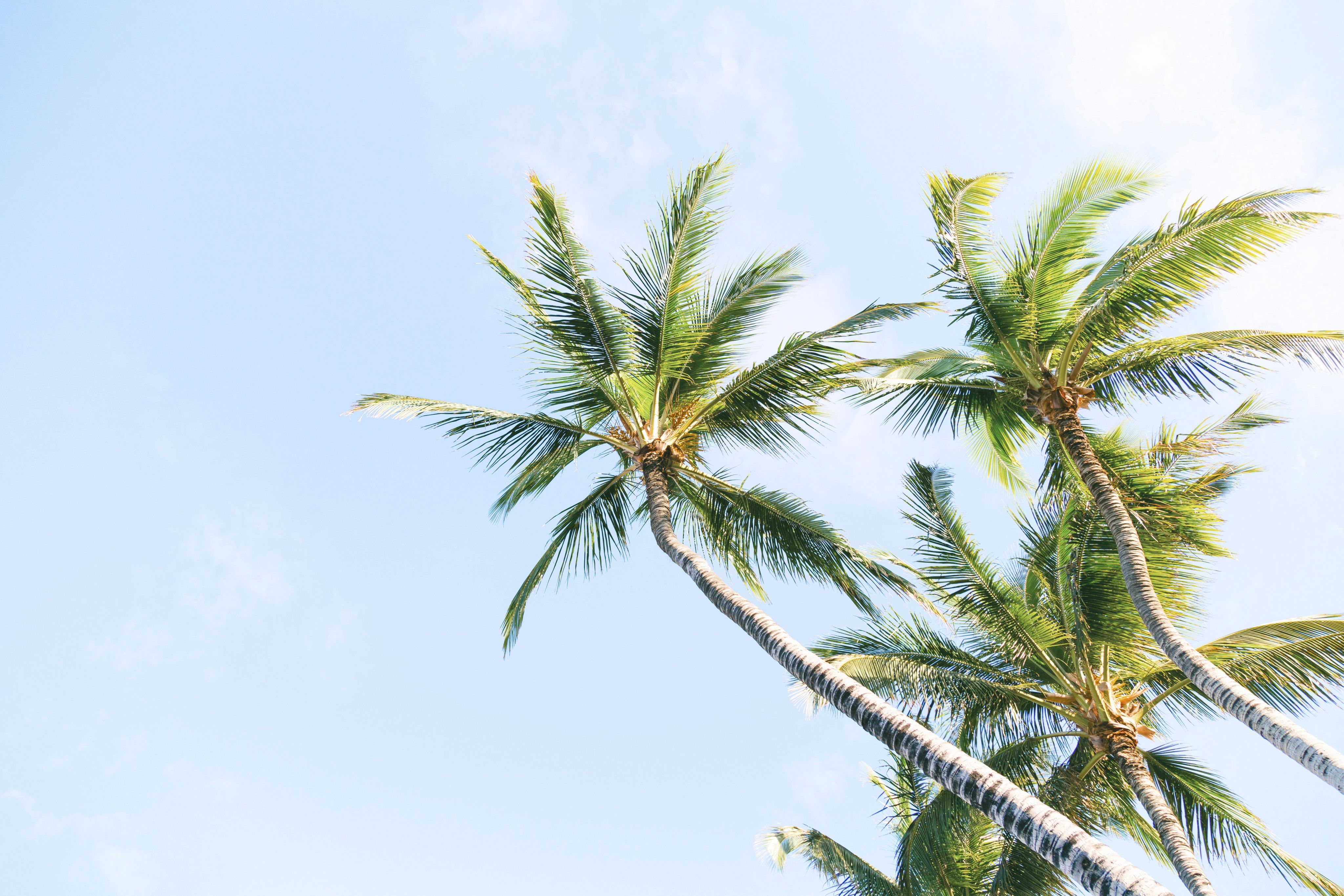
Platforms, networks & databases
- COGENT network - the International Coconut Genetic Resources Network (39 country members) aims to promote collaboration for the conservation and use of coconut genetic resources.
- International Coconut Community - an intergovernmental organization of 21 coconut producing countries organized in 1969 under the aegis of the United Nations Economic and Social Commission for Asia and the Pacific (UN-ESCAP).
- PAIS - the Pacific Agricultural Information System is the first place to come to find agricultural information, as well as from allied disciplines such as forestry, environment, fisheries, rural development, and ethnology, whether that is in the form of a journal article, conference paper, book, extension material (including videos), or theses.
- Plant Health Doctors Network - the network uses a variety of approaches and tools to help farmers diagnose and find solutions to plant diseases.
- Pacific Islands Pest List Database - hosted by SPC, the database stores records of pests that are currently known to affect agriculture, forestry and the environment in Pacific Island countries and territories (PICTs).
- PestNet - network that helps people worldwide obtain rapid advice and information on crop protection, including the identification and management of plant pests.
- WIEWS - founded by FAO, the World Information and Early Warning System on Plant Genetic Resources for Food and Agriculture is used for the preparation of periodic, country-driven global assessments of the status of conservation and use of PGRFA.
- PaCGRIS (under construction) - founded by SPC, it is the online browsable Pacific genebank of the Centre for Pacific Crops and Trees (CePaCT), that allows users to place orders for seeds, crops and trees.
- Pasifika NiuNet (under construction) - hosted by SPC, the sustainable platform for regional coordination of coconut research and development.

Audiovisual gallery
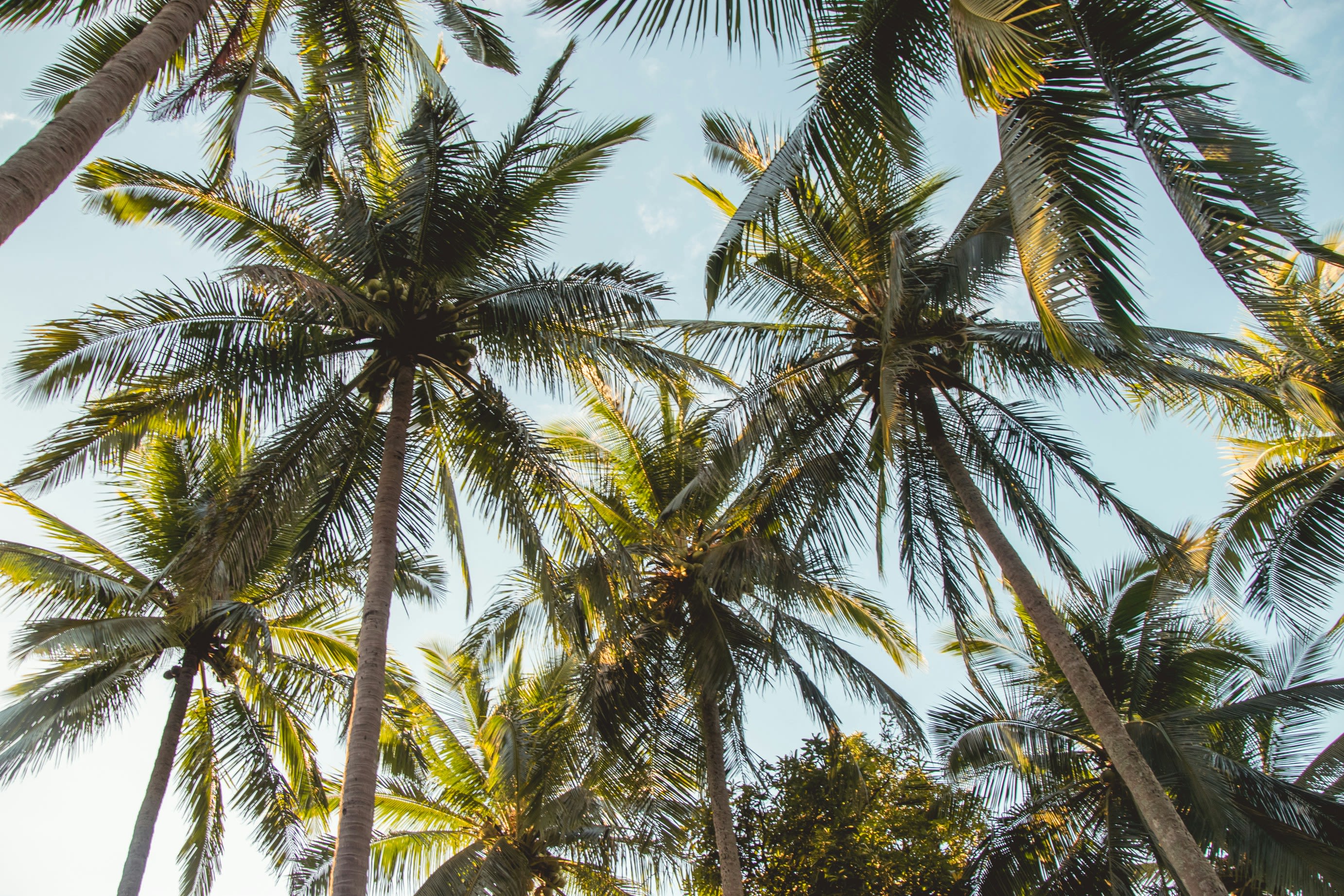
Contacts
Research: Dr Carmel Pilotti, Genebank Curator and Associate Scientist Coconut Genetic Resources, SPC | +679 720 4076, carmelp@spc.int
Media: Dominique Vinckenbosch, CePaCT Communications Officer, SPC | +679 299 6490, dominiquev@spc.int
